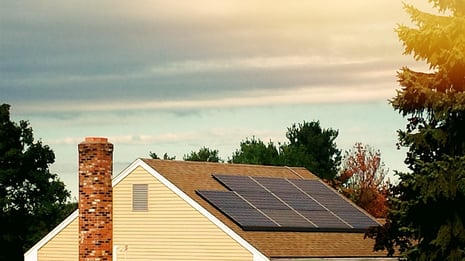
Residential solar panel systems offer homeowners incredible benefits to their energy expenses, home value, and environmental impact. Read the full article to learn the importance of residential renewable energy and how net metering works.
Solar systems are truly an investment in one’s home that can pay dividends for decades to come. During that time, homeowners can drastically reduce their reliance on public power grids, sheltering them from power line failures, storm damage, and blackouts. Homeowners can also often take advantage of federal, state, and local incentive programs for solar power installations, adding even more to the financial benefit of switching to solar.
There’s just one catch: solar power requires solar radiation. In other words, no power is generated after the sun goes down.
Homeowners have a couple of options to get around this snag in the otherwise incredible opportunity of limitless solar energy: battery storage systems and net metering.
A battery system can allow homeowners to store some power produced during the day for use at night. Most solar-equipped homes use less energy than they produce daily anyway, and storing the excess can often get you through any nighttime energy needs. However, battery systems can be a costly addition to a solar system.
The more accessible option for most homeowners is net metering, but you may not be aware of the concept or the possibilities it can offer.
Net Metering – An Answer to Energy Overproduction
Net metering began in the United States in the late 1970s and early 1980s, as small-scale renewable energy installations like wind turbines and solar panels started to gain traction. At the time, these technologies were still prohibitively expensive for most people, but the few homes and businesses using them started noticing the “day vs. night” phenomenon very quickly.
Solar panels on a home’s roof could produce energy for immediate use all day, but houses also need less energy during the day while people are typically at work. The extra energy produced was merely dumped back onto the power grid for distribution to other homes, so when solar panel owners realized they still needed to use electric utilities for power at night, they started wondering how they could harness the lost value produced during the day.
Thus was net metering born. In short, customers who generate all or some of their electricity are only charged for the net amount of electric utilities they use from the grid (the difference between the electricity they use and the electricity they generate). During the day, while solar panels are producing more energy than the home uses, that home’s electric meters can run backward, essentially reducing the net amount of energy the home uses from the grid and for which it is billed.
Local regulations and utility company policies on net metering can vary. In most cases, the electricity is credited back to your meter at predetermined rates, plus small fees for using the electric grid and connection fees. Today, net metering has been adopted into the energy laws of 43 U.S. states and by utility companies in three others. Only South Dakota, Tennessee, Mississippi, and Alabama lack any formal laws or utility policies regarding net metering.
Net Metering and Your Solar Installation
The benefits of net metering are a great reason to use a reputable solar system provider like DFW Solar Electric. System efficiency is key to maximizing your energy output, thus maximizing the potential for net metering benefits. We’ll assess your roof’s angles, shaded areas, and orientation toward the sun so that your system produces as much solar energy as possible.
In addition to the long-term economic benefits and the tax incentives available for installing solar panels, a system from DFW Solar Electric may also provide you with the bonus of overproduction. Thanks to net metering, that overproduced energy still belongs to you, and your contribution to the local power grid can start earning money right away.
Our Solar Energy Solutions
To get started with an estimate or an examination of your home’s solar production potential, call DFW Solar Electric at 972-827-7651 or visit us at https://dfwsolarelectric.com/. We don’t charge any hidden fees for exploring your solar options or designing your future solar system, so you can trust us to provide the best possible solution for your home.
Comments